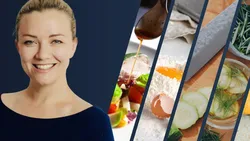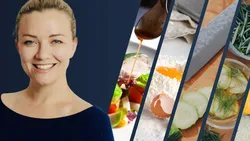
Culinary Education Crash Course - Basics in becoming a Chef 
Ready to become a great Chef? Take the Culinary Education Crash Course - Basics in becoming a Chef and learn all the essential culinary skills and techniques in just 90 minutes! Get to know food science, master culinary techniques, and learn how to elevate the flavour of the simplest ingredients. Download the workbook for extra tips and materials. Start your culinary journey today! ▼
ADVERTISEMENT
Course Feature
![]() Cost:
Cost:
Free Trial
![]() Provider:
Provider:
Skillshare
![]() Certificate:
Certificate:
Paid Certification
![]() Language:
Language:
English
![]() Start Date:
Start Date:
On-Demand
Course Overview
❗The content presented here is sourced directly from Skillshare platform. For comprehensive course details, including enrollment information, simply click on the 'Go to class' link on our website.
Updated in [April 29th, 2023]
This Culinary Education Crash Course is designed to provide an overview of the basics of becoming a chef. In 90 minutes, participants will learn essential culinary skills and techniques, basic culinary theory, and the right path to more sustainable cooking. After completing the course, participants will be able to confidently cook and present any standard dish from any culinary area. The course includes nine lessons and a bonus one, as well as a workbook with extra tips and supporting materials. Participants will also be able to access additional content from ChefRudakova on YouTube, Instagram, and her blog.
[Applications]
After completing this course, participants can apply their newfound knowledge to their culinary journey by practicing the techniques they have learned, such as assessing a well-cooked sauce, building flavor, and plating a dish. They can also use the workbook provided to further their understanding of the topics covered in the course. Additionally, participants can explore Chef Rudakova's other content, such as her YouTube channel, Instagram page, and blog, to continue their culinary education.
[Career Paths]
Three job position paths recommended to learners of this course are:
1. Executive Chef: Executive Chefs are responsible for managing the kitchen staff, creating menus, and ensuring that the food is of the highest quality. They are also responsible for developing new recipes and overseeing the preparation of food. As the demand for high-quality food continues to grow, the need for Executive Chefs is expected to increase.
2. Sous Chef: Sous Chefs are responsible for assisting the Executive Chef in the day-to-day operations of the kitchen. They are responsible for managing the kitchen staff, ensuring that the food is prepared correctly, and ensuring that the kitchen is clean and organized. As the demand for high-quality food continues to grow, the need for Sous Chefs is expected to increase.
3. Pastry Chef: Pastry Chefs are responsible for creating and preparing desserts, pastries, and other baked goods. They are also responsible for developing new recipes and ensuring that the food is of the highest quality. As the demand for high-quality desserts and pastries continues to grow, the need for Pastry Chefs is expected to increase.
4. Food Scientist: Food Scientists are responsible for researching and developing new food products. They are also responsible for analyzing food products to ensure that they meet safety and quality standards. As the demand for healthier and more sustainable food products continues to grow, the need for Food Scientists is expected to increase.
[Education Paths]
Answer:
1. Culinary Arts Degree: A Culinary Arts Degree is a great way to learn the fundamentals of cooking and gain a comprehensive understanding of the culinary industry. This degree program typically covers topics such as food safety, nutrition, menu planning, and restaurant management. It also provides students with hands-on experience in the kitchen, allowing them to develop their skills and gain valuable experience. The demand for culinary professionals is growing, and a Culinary Arts Degree can help you stand out in the job market.
2. Hospitality Management Degree: A Hospitality Management Degree is a great way to learn the business side of the culinary industry. This degree program covers topics such as hospitality law, marketing, and finance. It also provides students with the opportunity to gain experience in the hospitality industry, such as working in a hotel or restaurant. With a Hospitality Management Degree, you can gain the skills and knowledge needed to become a successful manager in the hospitality industry.
3. Food Science Degree: A Food Science Degree is a great way to learn the science behind food production and preparation. This degree program covers topics such as food chemistry, food safety, and nutrition. It also provides students with the opportunity to gain experience in the food industry, such as working in a food laboratory or food processing plant. With a Food Science Degree, you can gain the skills and knowledge needed to become a successful food scientist.
4. Culinary Entrepreneurship Degree: A Culinary Entrepreneurship Degree is a great way to learn the business side of the culinary industry. This degree program covers topics such as business planning, marketing, and finance. It also provides students with the opportunity to gain experience in the culinary industry, such as working in a restaurant or food truck. With a Culinary Entrepreneurship Degree, you can gain the skills and knowledge needed to become a successful entrepreneur in the culinary industry.
Pros & Cons

Overview of culinary world

Helpful classes

Concise overview of fundamentals

Suitable for all levels

Learned things never knew needed

Energy and personality

Limited set of information

Americancentric

Vague and lack specificity
Course Provider

Provider Skillshare's Stats at AZClass
Discussion and Reviews
0.0 (Based on 0 reviews)
Explore Similar Online Courses

Learn how to mint and sell your Non Fungible Token (NFT) for Beginners

Brand Illustration: Create Unforgettable Stylized Brand Imagery

Python for Informatics: Exploring Information

Social Network Analysis

Introduction to Systematic Review and Meta-Analysis

The Analytics Edge

DCO042 - Python For Informatics

Causal Diagrams: Draw Your Assumptions Before Your Conclusions

Whole genome sequencing of bacterial genomes - tools and applications

Culinary Education 101 - The Cooking Like a Chef Crash Course

Madhur Jaffrey Teaches Indian Cooking


Start your review of Culinary Education Crash Course - Basics in becoming a Chef